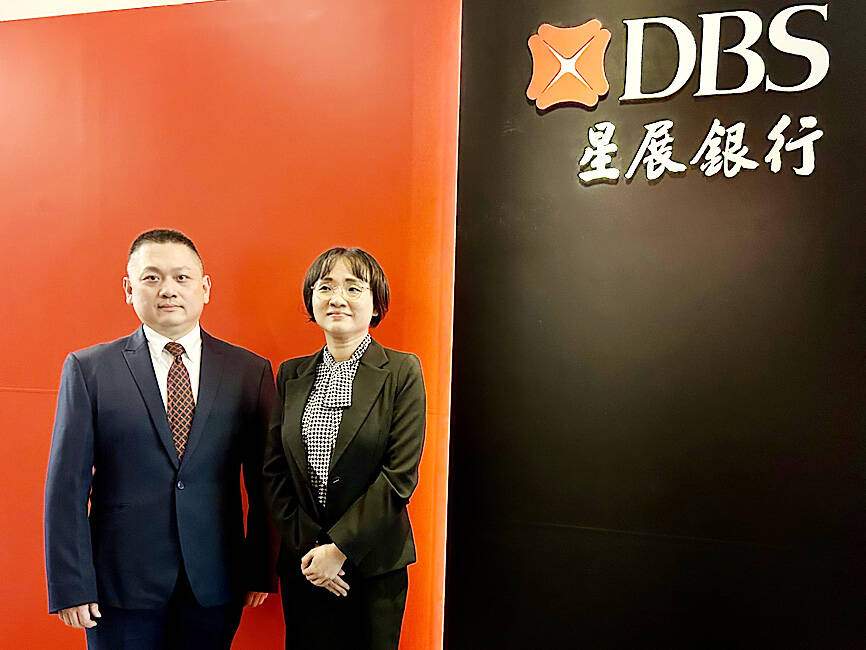Singapore-based DBS Bank yesterday raised its forecast for Taiwan’s GDP growth this year to 4.2 percent, from the 3.5 percent it predicted in April, as the nation’s exports are expected to improve, aided by demand for artificial intelligence (AI) applications.
DBS senior economist Ma Teiying (馬鐵英) told a news conference in Taipei that she was aware the projection is higher than most forecasts, including the Directorate-General of Budget, Accounting and Statistics’ 3.94 percent.
Ma attributed her optimism to a robust recovery and the arrival of the high sales season for technology products.

Photo: AFP
Growth momentum would pick up quarterly, but slow year-on-year due to a base comparison effect, she said.
Generative AI is fueling demand for high-performance AI chips in data centers, as US technology titans Amazon Web Services, Alphabet Inc’s Google, Microsoft Corp and others spend lavishly on developing AI-optimized chips to enhance operational efficiency and reduce costs in delivering AI-based services, Ma said.
AI integration in PCs and smartphones would also present new opportunities for commonly used applications, she said, adding that AI-capable laptops would make up 13 percent of the market this year and soar to 74 percent by 2027.

Photo: Wu Hsin-tien, Taipei Times
At the same time, AI-enabled smartphones would comprise 11 percent of shipments this year and spike to 43 percent in the next three years, she said.
World Semiconductor Trade Statistics recently revised its forecast for global semiconductor market growth to 16 percent year-on-year, up from its previous estimate of annual growth of 13.1 percent, citing robust advancements in memory and logic chip segments, Ma said, adding that the pace of expansion would reach 12.5 percent next year.
Gartner Inc has also projected that global revenue from AI chips would swell 33 percent year-on-year this year to US$71 billion, she said.
However, recovery in non-tech manufacturing sectors would continue to lag, as China’s soft private consumption and property market have dampened demand for imports of consumer goods, Ma said.
In addition, cross-strait tensions have slowed Taiwan’s exports of petrochemicals, textiles, metals, machinery and transportation equipment, she said.
China remains Taiwan’s largest export destination with a 30 percent share, despite efforts to diversify export markets.
DBS stood by its 2.2 percent inflation estimate for Taiwan this year and described the central bank’s monetary policy as moderate, although carrying a tightening bias.
The bullish property market might continue in the coming years on the back of economic improvement until the next negative technology product cycle, likely in 2026, Ma said.
Healthy economic fundamentals might give the central bank room to tighten lending terms, if necessary, to cool the housing market, she said.

Intel Corp chief executive officer Lip-Bu Tan (陳立武) is expected to meet with Taiwanese suppliers next month in conjunction with the opening of the Computex Taipei trade show, supply chain sources said on Monday. The visit, the first for Tan to Taiwan since assuming his new post last month, would be aimed at enhancing Intel’s ties with suppliers in Taiwan as he attempts to help turn around the struggling US chipmaker, the sources said. Tan is to hold a banquet to celebrate Intel’s 40-year presence in Taiwan before Computex opens on May 20 and invite dozens of Taiwanese suppliers to exchange views

Application-specific integrated circuit designer Faraday Technology Corp (智原) yesterday said that although revenue this quarter would decline 30 percent from last quarter, it retained its full-year forecast of revenue growth of 100 percent. The company attributed the quarterly drop to a slowdown in customers’ production of chips using Faraday’s advanced packaging technology. The company is still confident about its revenue growth this year, given its strong “design-win” — or the projects it won to help customers design their chips, Faraday president Steve Wang (王國雍) told an online earnings conference. “The design-win this year is better than we expected. We believe we will win

Chizuko Kimura has become the first female sushi chef in the world to win a Michelin star, fulfilling a promise she made to her dying husband to continue his legacy. The 54-year-old Japanese chef regained the Michelin star her late husband, Shunei Kimura, won three years ago for their Sushi Shunei restaurant in Paris. For Shunei Kimura, the star was a dream come true. However, the joy was short-lived. He died from cancer just three months later in June 2022. He was 65. The following year, the restaurant in the heart of Montmartre lost its star rating. Chizuko Kimura insisted that the new star is still down

While China’s leaders use their economic and political might to fight US President Donald Trump’s trade war “to the end,” its army of social media soldiers are embarking on a more humorous campaign online. Trump’s tariff blitz has seen Washington and Beijing impose eye-watering duties on imports from the other, fanning a standoff between the economic superpowers that has sparked global recession fears and sent markets into a tailspin. Trump says his policy is a response to years of being “ripped off” by other countries and aims to bring manufacturing to the US, forcing companies to employ US workers. However, China’s online warriors